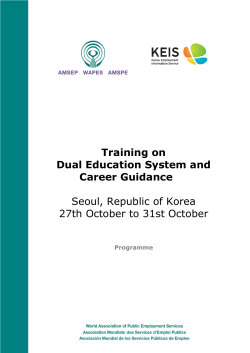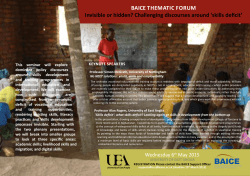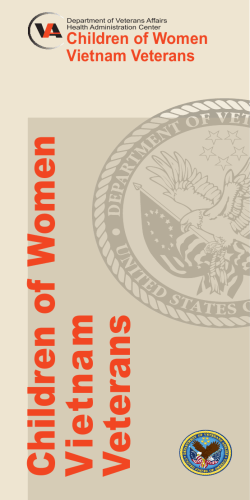
Document 237360
B2 THE BRUNEI TIMES | Tuesday, 9 April, 2013 W Tuesday, 9 April, 2013 | THE BRUNEI TIMES HAT is your impression of vocational/technical schools in terms of education? What role do they t play compared to other sixth form centres? If you entered one of these vocational/technical schools, what would be your plans when you graduate? What other courses should be availa able to encourage more students to enrol in a vocational/technical training institution? FAKHRI NOORADIN, 20, SVNR NAHKODA RAGAM VOCATIONAL SCHOOL STUDENT ANGELA JUMAT, SVNR STUDENT N terms of education, vocational schools are similar to high schools in terms of what we learnt in our O level syllabus; more or less what we learnt, we apply in vocational schools. Depending on the vocational path you are Ilooking to take, either you decide to begin with the basics, for instance, to study SC1/SC2 (Skills Certificate 1, 2) and N the past, I have been taught by a number of different teachers. Personally, I find it difficult to cope with Ithatconstantly changing teachers for different subjects. When I entered vocational school, I understood the courses were taught to me. Surprisingly, most of my subjects, especially mathematics, I found easy to understand. The then take a diploma or go straight for a diploma, which is roughly equivalent to taking A levels, in the sense that the syllabus directly links to a vocational course. However, taking a vocation course is different in that we get work experience related to what we wish our future career to be. For example, there are assignments and assessments through practical and technical work. Vocational courses play an important role when it comes to the real workplace because you already have a measure of experience. For instance, there are a few practical engineering classes on the diploma course which utilise workplace basics. The benefits? Those who enter a vocational school know that they are gaining practical experience and will have an advantage when it comes to joining the workforce. Plus, we are locals. If we work hard we will have a bright future here. During the course, there is a diploma requirement that you get short-term work experience. This attachment, which is paid, gives us first-hand knowledge of what we will be doing in the future. After I graduate, I would like to pursue a higher education course and work for a local company, such as Brunei Shell Petroleum (BSP) and/or apply to for an engineering job in the government or the army. As a suggestion, I think the workshop should be more spacious so that group practicals could be held to save time. There is also a need for a monthly allowance, because the allowances we receive are often delayed by up to three months, and some students can’t always rely on their parents to buy course materials. WAN SITI NORBAZEELAH KURATUL AIN HJ ABD RAFAEA, MTSSR MAKTAB TEKNIK SULTAN SAIFUL RIJAL STUDENT Y first impression of vocational/technical school would be that it concentrates more on practice rather than theory. M I think through this educational path, it makes you see things more clearly because you have to put theory into practice. Every student undergoes six months of industrial placement and this makes it easier to find a job. It also teaches you skills that you will need and lets you assess how good you are - your personal performance, how well you work with people, how good your communication skills are, how well you manage tasks and problems. Common skills actually help you identify for yourself your abilities and skills that will be needed when you are working. So, I am glad that we are taught this, because you need to have a good personality when applying for a job. After graduation, students are sure to get a job because of the work experience gained from previous industrial placements. My late father once told me to give priority to my studies because “study is for life and forever”. So I don’t want to just stop here. I want to further my studies perhaps overseas or locally until master degree level or until I am fully satisfied with where I am. I know I still have a lot to learn in life. After graduating in hotel and catering management, most of my friends are hoping to do a culinary art course here. Taking a hospitality and tourism course lets you meet a lot of people from different backgrounds. I would like to suggest therefore that there should be a unit on foreign languages. In terms of other courses, other than mine, why not give recognition to or upgrade less demanding courses such as administration management, drama, cosmetology, fashion design, hospitality, agriculture, etc. And instead of sending students abroad, why not have courses such as dentistry and archaeology here in Brunei. This may help to increase the skill levels of Bruneians and boost the local economy as well. In terms of facilities, I suggest education centres invest in proper safety equipment and filtered tered water dispersers everywhere, as well as a student common room, lockers, showers, even a fitness centre and a surau (prayer hall). EZZAH HASZAHRIN, 19, PTEM PUSAT TINGKATAN ENAM MERAGANG GRADUATE interested in the geomatic course that involves site surveys and building plans. IlevelIAMfindinto vocational schools helpful because we can put what we learnt at O level and A practice. I find it a bit awkward because sometimes we don’t know how to apply most of the knowledge we learnt theoretically. In turn, this helps apply what we learn to our work. For example, in sixth form, when we learn physics, we learn about theories, which may not necessarily be put into practice. In vocational/technical schools, we learn to apply course work to projects so it’s basically practice for a future career. In the future, I plan to work for my grandparent’s company, SHIKA Hj Idris Kalong & Sons, to expand the business in specialised building and construction work in the country and internationally. As a nation, increasing our expertise in fields such as engineering will allow us to be self-sufficient when it comes to workers so that we don’t have to rely on foreign consultants. reason I found things easy is probably because of the interactive use of the internet, as opposed to conventional learning from textbooks. I heard from sixth form graduates that their subjects were difficult to cope with. Compared to sixth form subjects there are many courses offered at vocational centres. When you are taught here, the course is more subject-focused towards an area such as cosmetology - make-up and haircutting/hairstyling. It involves a lot of practical work, as opposed to just theory because theory is taught through practice. After I graduate next year, I hope to continue my studies in higher education overseas. I hope to go to the United Kingdom and take a course that is related to cosmetology. Personally, I would like to focus on make-up and be the first female make-up artist in Brunei Darussalam. On the question of improvements for other students, I would like to suggest introducing a fashion design course that has a Brunei focus. Also, in regard to the cosmetology course, I would like to see a more specialised and comfortable room. DK NURSAKINAH PG HJ BAKAR, 20, NATIONAL DIPLOMA IN TRAVEL & TOURISM, MTSSR O be honest, I knew nothing about this school from the outside. I thought it was just a workshop until my friend told me that is was a school and suggested I apply. I got interested when I saw that one of the courses was T tourism and so I tried to ask more questions. When I finally got in, I actually found out that it was a good school. If I were to compare technical and vocational schools with sixth form, I would say it was actually more important to be at a technical school because we are more focused on practical skills. If we were at a sixth form school, it would be more hectic, with tight schedules and everything, but for us, we have an attachment which basically teaches us to be more open to the world. I think our school needs a better student activity centre. We do have one but it can only accommodate up to 20 students. We have a lot of students here so we need a lot more space. We also need a research centre where students can easily do their research if they do not have internet at home. I have been planning to work after I graduate but if I am not fated to do so, I will probably continue my studies by taking an HND (higher national diploma) and a degree after that. RABIATUL NADZIRAH MD NORKIFLEE, SVNR STUDENT S a vocational student, I find the courses here more practical. It is also nice that the courses give students AWhencreative freedom. Courses are not always taught “by the book”. I entered this school, I found that I was given opportunities to try out new things that are not offered anywhere else. In the long term, I hope to join my family’s business and open my own saloon and café. Vocational schools are not a student’s usual first choice because of the poor impression they make. Graduates or current students should showcase the skills they have learnt through the internet so that others know they offer a unique higher education path. | B3
© Copyright 2026





















